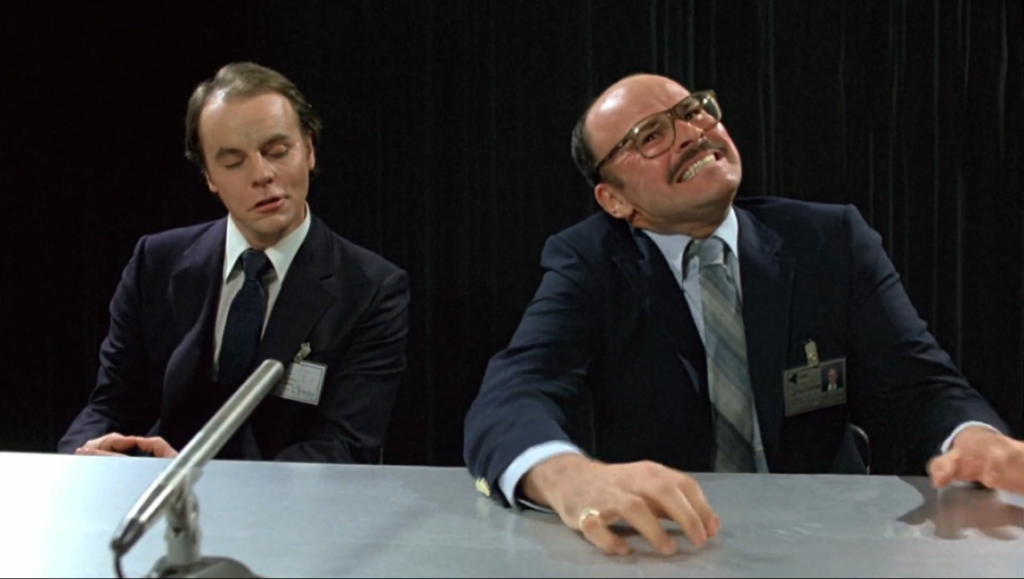It seems natural to react with bewildered laughter when watching Scanners. The sight of actors contorting themselves with pained screams and Dick Smith’s visceral special effects work conjoin to present moments so vigorous, so carnal, the viewer often has to expel some kind of emotion too — be it disgust or amusement. In fact, ‘moments’ are all this film really consists of. Cronenberg started production on Scanners before having finished the script, then resorted to writing pages in the morning before filming. This most likely contributed to this film’s most curiously structured plot, something that proceeds on a scene-by-scene basis and is held together by little more than the threads of mystery that underlie its story. Scanners also marked somewhat of a shift in Cronenberg’s oeuvre, moving from the concentrated horror scenarios of the director’s early features to something that evokes science-fiction and the thriller genre in a much more expansive fashion. In any case, Cronenberg’s recurring fascination with transhumanism and physiological modification find another great outlet here — and in fact Scanners becomes a fitting precursor for the rest of his ’80s work. The story begins with Cameron Vale (Steven Lack), a ‘scanner’ living as a vagrant outcast whose wide array of psychic powers lead to him being swept up by the security firm ConSec. Soon after, the corporation sends Cameron to locate Daryl Revok (Michael Ironside) — another scanner, who plans to build an army for the purpose of world domination — and put a stop to his enterprise. This all culminates in a battle of the minds between these two men — a fiery showdown wherein the audience receives the full Grand Guignol treatment.
Marked somewhat of a shift in Cronenberg’s oeuvre, moving from the concentrated horror scenarios of the director’s early features to something that evokes science-fiction and the thriller genre in a much more expansive fashion.
Within the first few minutes of Scanners, we’re introduced to the commercialized space of the mall, an aseptic church for consumers into which is injected an undercurrent of radical power — waves propelled through the air by Cameron’s psychical aggression, traveling in tandem with sonorous synthesizers. The tumultuous din of human company is exactly what has driven Cameron to solitude; he violently rejects society, in convulsive agony, so that the disembodied voices cease to haunt his volatile psyche. But this world is also haunted by the spectre of corporate power, products, and, more importantly, chemicals that have turned the unsuspecting into experiments and potential soldiers of the future. It becomes clear that this is a film of warring entities defined by their ability to manifest their will into phenomena — scanning, a cosmic pressure directed inwards or outwards, imploding or exploding. Harnessing the emitters of this psychical force is Revok’s aim; and yet, when the air becomes agitated and the amplitude increases, divergent wills entangle, building in magnitude before ejaculating from the brain in a burst of fire. Both men’s twisted faces pause in a second of transparent violence; plastic melting and circuits combusting amidst a shriek. What this boils down to is a matter of individual wills proving too hazardous — too gargantuan, even — for the sterilized space of modern society, arousing thoughts of an alternate ’60s, during which the counterculture succeeded through revolution. Some of the later images, those of Cameron’s psyche invading a computer network and his hopping between hosts to gather the two lost brothers into a single body, offer an affirmative reminder of the scanners’ ability to share sensations and become one with the technology that surrounds us. Thus, the finale, though eerie, can be seen as an auspicious moment rare in Cronenberg’s body of work; one in which mankind doesn’t become subsumed into the bowels of a technological singularity and instead bridles this newfound energy to assemble and unify the humans of the future.
Part of Kicking the Canon – The Film Canon.


Comments are closed.